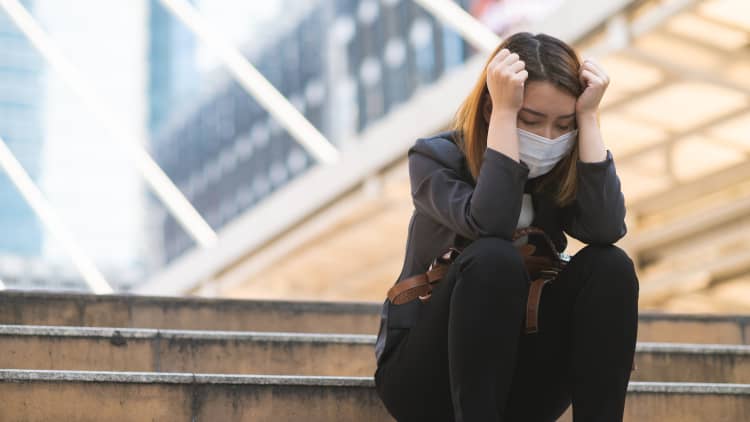White House advisor Dr. Anthony Fauci said that Americans should brace for fall and winter, when the coronavirus is expected to surge due to cold weather and increased time indoors.
"We need to hunker down and get through this fall and winter because it's not going to be easy," Fauci told Harvard Medical School on Sept. 10.
That means Covid stress, never-ending days, Zoom happy hours and grocery delivery could once again become America's reality. Combine that with the fact that people tend to start getting pessimistic in the winter, and for many the thought of being stuck at home for an extended period of time is bleak.
But there are things that can make a difference.
"Instead of approaching this with fear and trepidation and dread, we just need to prepare ourselves as much as possible," says Jeff Gardere, board-certified clinical psychologist and associate professor at Touro College of Osteopathic Medicine in New York City.
Here are some tangible tips that will help you maintain a positive and prepared mindset as the pandemic reaches into a new season:
Wake up at a normal time
Waking up when it's still dark outside can feel like a bummer, but sleeping in later won't improve your mood, Gardere says. It's important to stick to your regular wake-up and bed times, even if you're still working from home and don't need to commute.
Your entire sleep schedule can get thrown off by later wake-up times, or naps during the daytime, Rachel Manber, director of the Stanford Sleep Health and Insomnia Program told Stanford Medicine. "These behaviors have negative impact on the biological clock that regulates sleep and wakefulness and therefore lead to problems sleeping," she said.
Getting a good night's sleep can help you respond to mental stressors, as well as help your immune system function optimally.
Get some light
Turn on your lights first thing in the morning because light exposure will signal to your brain that it's time to wake up, Gardere says. Plus, the lack of natural light in colder months is one of the main contributors to seasonal affective disorder (or "SAD"), a type of depression that typically occurs each year during fall and winter. And exposure to artificial light from lamps can be just as beneficial to the brain as natural sunlight.
Light exposure affects neurotransmitters such as serotonin, which is involved in mood regulation. Positioning a therapeutic "light box" (which is brighter than a standard indoor light) about 16 to 24 inches from your face for 20 to 30 minutes first thing in the morning has been shown to reduce symptoms of SAD and increase energy. You can find therapeutic light boxes on Amazon for $30 to $200. But experts say you should look for a light box that provides at least 10,000 lux, which is a measure of light intensity.
Find a way to be comfortable outdoors
Outdoor activities are safer than ones held indoors, because there's more air flow and space to maintain social distance. For those who live in parts of the U.S. where it gets cold in the winter, make sure you have the supplies you need to comfortably gather outdoors, such as cold-weather clothing, Gardere says. "Get excited about your winter gear," he says.
If you have access to outdoor space, consider an outdoor heater or blankets.
Plus, prep your indoors
Since you're going to be inside more than usual, it's important that you "refashion your environment" to better suit your needs, Gardere says. For example, you may want to get a desk to have a proper remote workspace. Or display photos of things that make you feel relaxed, like a snowy landscape or beach scene, he says.
And if you need another excuse to spruce up your interiors, studies suggest that when your indoor environment is organized and free of clutter, you're less stressed and able to focus better.
Exercise — no, really
Gardere says he uses an indoor cycling bike every morning because it gets neurotransmitters flowing that help your mood and focus, such as endorphins, dopamine and serotonin. Find a type of exercise that you enjoy and can safely practice at home or outside. For example, Gardere suggests power-walking at a brisk pace with a friend, or taking a break during the workday to get outside for a short walk.
Find a hobby
Winter might be a good time to pick up a hobby, or an activity that you know can keep you entertained, Gardere says. Whether it's baking or completing crossword puzzles, studies suggest that when people have hobbies they tend to be less stressed, more focused and less likely to experience burnout.
To that end, if you find that you can no longer enjoy the or hobbies or activities that you once loved, or you feel isolated from others, you may want to talk to a therapist or mental health professional, Gardere says.
Check out:
Don't miss: We analyzed 111 rewards cards, and the best one could earn you $2,000 over 5 years



